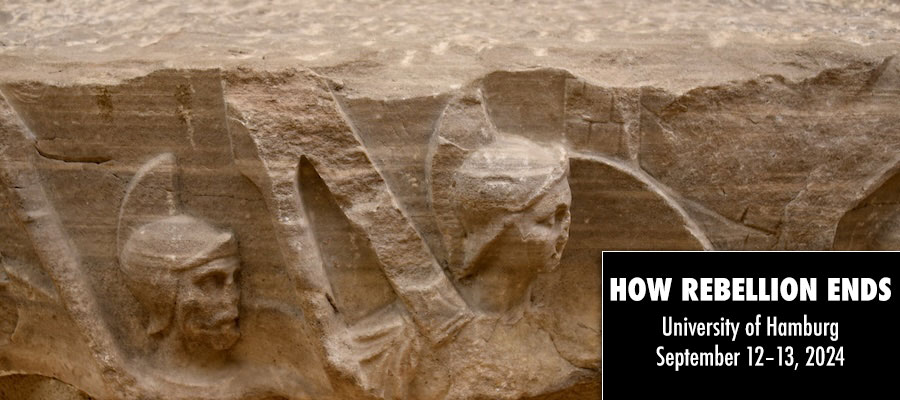How Rebellion Ends, University of Hamburg, September 12–13, 2024
The Emmy Noether Junior Research Group ‘Social Contexts of Rebellion in the Early Islamic Period’ (SCORE) invites submissions for an international conference on rebellion in the early Islamicate world and its late antique predecessors (c. 500–1000 CE). The conference will be held in Hamburg (Germany) on 12–13 September 2024.
SCORE studies rebellion and related categories (such as banditry, martyrdom or civil war), foregrounding sociopolitical and socioeconomic rather than more traditionally emphasised religious causes.
We invite submissions that discuss processes and mechanisms of conflict resolution in Late Antiquity and the early Islamic period from theoretical and/or source-based perspectives. We particularly welcome case studies of distinct revolts, as well as papers that seek to apply methods, theories, and insights from other fields to the study of ‘how rebellion ends’ in the early Islamic period. Recognising the complexity and diversity of early Islamicate societies, we are also especially keen to include studies of contention and its resolution in non-Muslim communities under Muslim rule, as well as contributions that examine these processes within non-elite and marginalised groups and individuals (e.g., women, slaves, peasants, certain groups of mawālī).
Speakers are invited to discuss conflict resolution in all its dimensions. These include, but are not limited to, the following themes and questions:
- Actors: which individuals and groups were involved in resolving conflict?
- Institutions: which social, legal, economic and political structures and processes were employed in conflict resolution (e.g., negotiation, mediation, amān, pledging or exchange of hostages, military force)?
- Discourses: (how) do accounts of revolts employ repertories of resolution and legitimacy/loyalty and disloyalty?
- Reintegration: how were rebels brought back into a political and social community during or following the resolution of a revolt? What happened to people who rebelled multiple times?
- Regeneration: how were conflict-affected regions resettled and brought under renewed cultivation following conflict resolution?
- Punishment: how were members of a defeated party or functionaries of a victorious party punished for disloyalty or abuses?
- Violence: what role did the use of violence (by either state agents or rebels) play in responses to rebellion? To what extent was violence performative?
- Constituencies: did different ethnic, linguistic, religious, social and political groups employ different methods of conflict resolution? Did statist institutions use different methods to deal with different constituencies?
- Contexts: to what extent is a common culture of conflict resolution in evidence between the major imperial and post-imperial contexts of Late Antiquity and the early Islamicate world? (Roman, Byzantine, Sasanian, Islamic, Frankish.)
- Implications: what can cultures of conflict resolution tell us about sociopolitical and ideological structures and concepts within these societies more broadly?
- Archaeology: to what extent can the ends of revolts be traced through the material culture of defensive settlements, sieges, assaults or battles?
- Memorialisation: how do textual and material sources attest to the commemoration and celebration of conflict resolution? (E.g. inscriptions, monumental architecture, proclamations, processions and other performances, liturgies, payments.)
Papers will be pre-circulated. Each paper will be allotted a 45-minute slot, comprising 10 minutes for a short presentation of the paper’s main points followed by 35 minutes of discussion.
